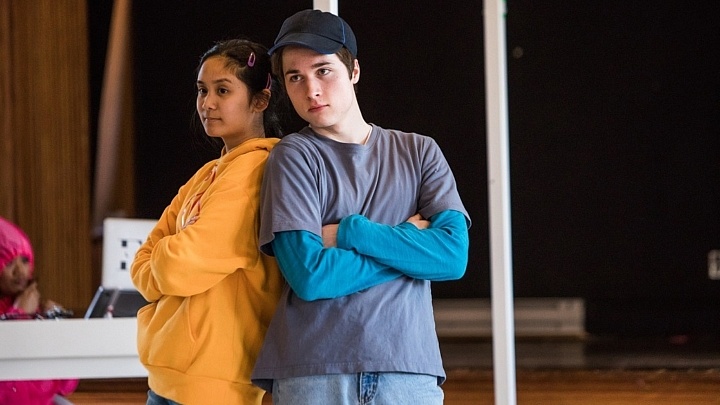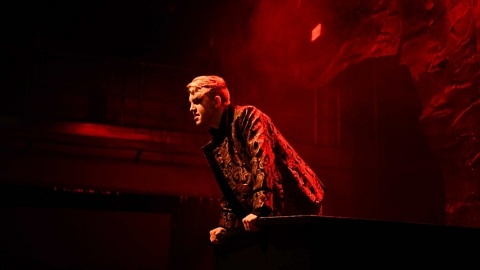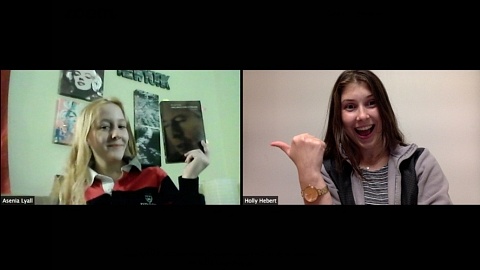For nearly two years, theatre lovers have felt entrapped in their own little purgatories. Artists have been unable to perform on stages, and audiences been...
Emma McCormick and Kristina Ojaperv write,
At last, the day for excellence arrives – the first performance of This Will Be Excellent. Arriving at Oakridge Public School early on February 5th, we are excited to see the culmination of the many rehearsals that came before. The show is set up in the gymnasium, with the final preparations and warm up well underway as we sit at the back. All of Carousel Players’ staff is present, including new artistic director Monica Dufault, production manager David Costello, and outreach and marketing Manager Lauren Humbert, alongside the familiar faces of Erin Brubacher and stage manager Maureen Callaghan.
We reflect upon our different reactions to this performance space – the school gymnasium. As the Canadian anthem starts playing over the announcements Emma can recall many mornings at her own elementary school, and feels a sense of familiarity with the space. Kristina, on the other hand, with only two and a half years of experience in Canada, greets the space with curiosity, and an eye to the cultural difference between schools in Canada and Estonia.
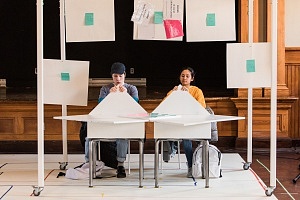
Theo Gallaro and Maddie Bautista in This Will Be Excellent. Photo by Lauren Garbutt.
As students from grades four to eight file into the gymnasium, a sense of nervousness befalls us – even though we are not the ones performing. The actors have no backstage area in this set up, and so must face their audience from the moment they arrive. As performers ourselves, we feel all the anticipation and energy of the room, and understand a bit of what the cast and creative team must feel. In the moment before the show begins, we are hoping for their success, and for an excellent run.
The audience, to their credit, is fairly attentive throughout. The younger children at the front seem particularly engaged, especially the young boy who is asked to hold a prop phone during a scene in which Daniel and Izzy record their video for the rapper Arrow. There are many moments of the children whispering to their neighbours, and although we are not close enough to catch specific words, we understand the whispers are about what they are seeing. Even the more aloof preteens at the very back find moments of rapt attention – particularly when Nicole Joy-Fraser, playing school bully Justin, circles behind the audience as a means of entering the stage – though this could be due to the close proximity between performer and spectator.
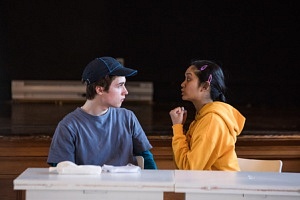
Theo Gallaro and Maddie Bautista in This Will Be Excellent. Photo by Lauren Garbutt.
This being our first time watching the show all the way through, there are many new moments to observe. Thinking back to Brubacher’s original intention of involving the school-aged audience, we can see many of these choices come to fruition. Successful iterations of this include staging part of a scene in the midst of the crowd of children, retrieving props from the audience, and the inclusion of a music poll during the “assembly” scene. This poll is presented under the guise of the song the children want Arrow to perform, but actually serves as the dance party music at the end of the show. This is perhaps the most engaging part of the show, in terms of vocal involvement. The children laugh, are eager to raise their hands for their favourite song, and it takes some effort on the part of the actors to juggle the children’s energy and their acting duties. The underscoring of real world music also has a noticeable effect – when the instrumental introduction from Cardi B’s “Bodak Yellow” begins, the children groan and ooh in recognition, but do not lose focus. The children’s investment in the plot is quite evident – some left expressing their disappointment about the purposefully unsatisfying end, and accusing the characters of “lying” to them. It seems the lesson of learning to handle disappointment in life is both difficult and necessary for children and adults alike.
We pay close attention to the transitions, which we have seen much of throughout the rehearsal process, and find them suitably polished. We also reflect on the effectiveness of the audience interaction. In the Carousel Players’ rehearsal room we do not see the scenes where the actors move through the audience. However, we did attend the rehearsal where they practice audience interactions, specifically the music poll.
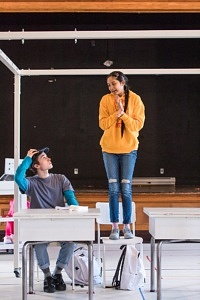
Theo Gallaro and Maddie Bautista in This Will Be Excellent. Photo by Lauren Garbutt.
The difference between a small room of adults and a gymnasium of children being asked their opinion is staggering in terms of energy. Perhaps it is the strength of the children’s energy when they choose to engage that makes it evident when the performance does not connect. A few awkward moments occur, where the actors bid the audience vote or to dance at the very end, and it is clear that many of the students are not willing to comply. The actors navigate these moments adroitly, but we wonder whether success or awkwardness is the take away feeling for many audience members.
Days later, we listen to our classmates discuss the public performance of This Will Be Excellent at the First Ontario Performing Arts Center, specifically their reviews of the show. While each review finds its own focus and star rating, we notice our classmates raise concerns about a shared personal challenge: how to review a show for a different target audience than themselves. As we discuss in our earlier posts, Carousel Players focuses on theatre for young audiences. Being university students, we do not typically seek out their particular brand of theatre, nor do the problems of the protagonists – which centre on school involvement and friendship in Excellent’s case – reflect our current lives. Thus, our classmates find it difficult to express their opinions without feeling the need to couch them in their bias as adults.
This seems to us a relevant metaphor for our own journey in embedded criticism. Just as our classmates do not want to impose their opinion because they are distant from the target age group, we at times feel too close to the work of the cast and creative team to judge the product, or evaluate the methods in practice. It is easy to forgo a critical lens entirely, even if only for the sake of politeness and professionalism.
When our classmates do express their opinions, they are varied and usually quite emphatic. We note that some moments find misinterpretation in the new eyes of our classmates, moments we do not see the same way after being familiarized with the show in rehearsal.
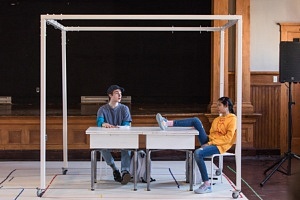
Theo Gallaro and Maddie Bautista in This Will Be Excellent. Photo by Lauren Garbutt.
A moment where Izzy removes a swing set piece from of a desk is seen as a pile of rope – with several of our classmates jumping to a far darker suggestion of what she is about to hang from the set piece, before quickly realizing their mistake as the swing is set up. It is worth mentioning that many people in the class express this initial misreading of this moment, perhaps marking a difference in the critical perspective between the target audience and spectators outside of elementary school.
We arrive now at the end of our embedding experience. We hope our posts have incorporated a critical edge, while also reflecting truthfully the work of the artists we observed, as well as our position as spectators. Erin Brubacher, Carousel Players, and This Will Be Excellent’s cast and crew welcomed us warmly into their rehearsal room, for which we are immensely grateful. It has been a valuable experience to witness the effort of bringing both theatre for young people and a touring show to life, and the many considerations that this necessitates in rehearsal. This project has opened our eyes to the oft-neglected work of theatre making, and proves that embedding is not only important to theatre criticism, but also excellent.
Related Posts
It’s been a few weeks since the final performance of Brock University Department of Dramatic Arts’ Fall Mainstage, Scenes from an Execution. Closing off their...
Here’s Holly Hebert’s final solo vlog from behind the scenes of the Fall 2020 DART Mainstage, Scenes from an Execution. She and Asenia will round off this...
It’s been a few weeks since the final performance of Brock University Department of Dramatic Arts’ Fall Mainstage, Scenes from an Execution. Closing off their...
Here’s Holly Hebert’s final solo vlog from behind the scenes of the Fall 2020 DART Mainstage, Scenes from an Execution. She and Asenia will round off this...
Leave a Reply (Cancel Reply)
Twitter Feed
Blogroll
DARTcritics.com is partially funded by the Marilyn I. Walker School of Fine and Performing Arts, in support of student learning; experiential education; student professionalization; public engagement with the teaching, learning and production activities of the Department of Dramatic Arts; new ways of thinking; and the nurturing of links with our communities.

